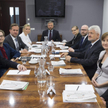Although we will have accurate data on the fees for plastic bags at the end of the year, we can already see how many shops are selling thicker and thicker bags at the same price. We need to think about how to solve this problem. But there is also some good news. More and more customers come with reusable bags or pack their purchases in cardboard boxes from the store.
You’re talking about shops. What about producers?
For manufacturers, this motivation must be even greater. Producers who extend the life of their products or industries that recover raw materials from goods previously produced could, for example, receive tax reliefs.
On the other hand, if the company is not able to collect the packaging introduced to the market or prove how much it has processed for re-use, it will pay more as part of the so-called product fee.
Together with the Ministry of the Environment, we are working on the priorities of the roadmap. And for the first time in many years the interest of the environment is not on the margins of the economy.
The Ministry of Enterprise and Technology is working on a package of protective measures for the energy-intensive industry. There will be direct subsidies, to which 25 percent of funds from the pool of emission allowances sold by the state every year will be allocated. And what about other reliefs?
For the time being, 25% of the pool directed to direct subsidies for energy-intensive industries is only a proposal. We see the importance of industry and its importance for the economy. On the other hand, we realise that Europe is the leader in terms of technological requirements for clean production. Therefore, we must not allow these companies to lose their competitiveness when confronted with global brands. Compensation is intended to mitigate this risk.
We are still discussing other elements of the protection package, e.g. the quality fee or cogeneration relief (for the production of electricity and heat in one process).
We need a few weeks to complete the works.
Returning to the circular economy roadmap. When will this strategic document be ready?
I hope to have adopted the document at the Council of Ministers by the end of November. This will be the beginning of the legislative path of this document. At the same time, it will be a kind of distribution of roles between individual ministries. Because it is them who are to prepare a series of detailed regulations, e.g. with regard to the delineation of projects and equipping them with tools for their implementation.
The roadmap only needs to make us aware of the amount of legislative work still ahead of us.
What will be the impact of the implementation of these measures on the economy or the labour market?
We will prepare such estimates for the climate summit in Katowice. Perhaps we will use the strategic programme GOSPOSTRATEG, implemented by the Ministry of Science and Higher Education as part of the NCRD competition. Its aim is to create indicators for particular branches of industry, which prove the effectiveness of waste utilization. Perhaps it will be an excuse to establish fees for those who do not meet the requirements, e.g. in terms of recycling.
On the other hand, the administration has not yet motivated our manufacturers to implement this idea. Our furniture manufacturers win tenders for providing the equipment to Dutch and Belgian government offices. Because in Polish tenders ministries do not have such priorities.
During the last change of equipment in the ministry, we paid attention to promoting Polish design. Taking into account the life cycle of products also seems to be a good idea. Especially as we are currently working on the amendment of the Public Procurement Law.
The purchase of equipment and its repair service brings the discussion about prices onto a completely different level.
What other legislative initiatives need to be taken to bring us closer to circular economy?
Certainly, the biggest changes will include waste regulations. Some have already been implemented, because we have to implement EU directives and regulations within a certain period of time. Hence the waste acts, which have already come into force but still need to be corrected.
We have a huge problem with illegal landfills. This is where technology can help. By implementing geolocation and digitalization of processes, we will gain this knowledge without large financial outlays.
How does your department see the role of private companies operating on the waste market? Some of them complain about discrimination and losing the market to unprepared municipal companies.
The subject is difficult and not entirely obvious. Initially, the municipalities were happy that the competition on this market would force a fall in prices. The only problem is that small companies merged with larger ones. That is why in many towns and cities there is still one company that dictates prices and wins the tenders.
Many mayors are thinking about creating a partnership company dealing with waste management from several adjacent municipalities. As a result, they could pay less than for services ordered on the broad market.
What is the message from the Ministry of Enterprise and Technology for the climate conference in Katowice, the so-called COP24?
We want to boast about the government programme „Clean Air” and show how we have decided to solve one of the most serious problems in our country. Such a model of fighting for improvement of air quality – including, on the one hand, a comprehensive legislative approach and, on the other hand, financial support for both thermal upgrading and heat source exchange – may become an inspiration for other countries struggling with smog. COP24 will ensure good exposure to the whole world.





















